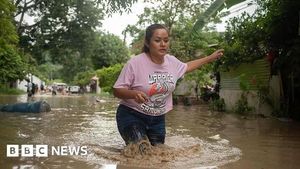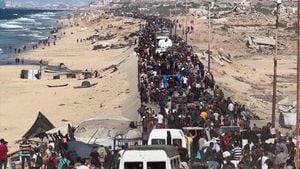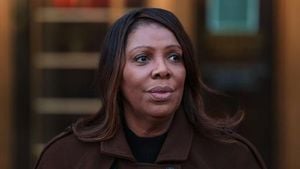The Eurovision Song Contest, long celebrated as a rare moment of unity and festivity across Europe and beyond, now finds itself at the center of a heated international debate. Several countries, led by the Netherlands and Ireland, have announced they will boycott the 2026 competition in Vienna if Israel is permitted to participate, citing the ongoing war in Gaza and the mounting humanitarian crisis there. The standoff has triggered a cascade of reactions from broadcasters, musicians, politicians, and activists, raising questions about the intersection of art, politics, and conscience in one of the world’s most-watched televised events.
On September 12, 2025, Dutch broadcaster AVROTROS declared that the Netherlands would not take part in the upcoming Eurovision Song Contest if Israel remains in the lineup. In a statement, AVROTROS said its decision was motivated by "the ongoing and severe human suffering in Gaza" and "the serious erosion of press freedom," referencing Israel’s ban on international media entering the territory and the many casualties among journalists. "Human suffering, the suppression of press freedom and political interference are at odds with the values of public broadcasting," the broadcaster stated, according to BBC and AP. The Dutch move echoed a similar announcement from Ireland’s RTÉ just one day earlier. RTÉ described Irish participation as "unconscionable given the ongoing and appalling loss of lives in Gaza," and also expressed deep concern about the targeted killing of journalists and the denial of access to international media.
These decisions have not emerged in isolation. Slovenia and Iceland have also stated that their participation in the contest is contingent on whether Israel is allowed to compete. According to AP, Spanish Prime Minister Pedro Sánchez has openly called for Israel’s exclusion, while Finland’s national broadcaster has said it will decide by December 2025 whether to join a boycott. The European Broadcasting Union (EBU), which organizes Eurovision, is now under mounting pressure as it consults its dozens of member broadcasters on how to "manage participation and geopolitical tensions" around the event.
Martin Green, Director of the Eurovision Song Contest, acknowledged the gravity of the situation. "We understand the concerns and deeply held views around the ongoing conflict in the Middle East," he said in a statement reported by BBC and Sky News. "We are still consulting with all EBU members to gather views on how we manage participation and geopolitical tensions around the Eurovision Song Contest. Broadcasters have until mid-December to confirm if they wish to take part in next year's event in Vienna. It is up to each member to decide if they want to take part in the contest and we would respect any decision broadcasters make."
The 2026 contest is scheduled to take place in Vienna, Austria, with the grand finale set for May 16, following semi-finals on May 12 and 14. This comes after Austrian singer JJ triumphed in a dramatic finish at the 2025 contest, narrowly beating Israeli performer Yuval Raphael, who finished second. The 2025 edition, held in Basel, Switzerland, was itself marked by tension, with pro-Palestinian and pro-Israel protests outside the venue and audible boos from the audience during Israel’s performance, according to Sky News.
The roots of the current controversy trace back to October 7, 2023, when a Hamas attack left around 1,200 people dead in Israel, sparking a massive Israeli military response in Gaza. As of September 2025, more than 64,000 Palestinians have been killed, according to figures cited by Sky News and AP. The conflict’s toll on civilians and journalists has been a central concern for those advocating the Eurovision boycott. RTÉ specifically cited "the targeted killing of journalists in Gaza, the denial of access to international journalists to the territory, and the plight of the remaining hostages" in its rationale for withdrawal.
The campaign to exclude Israel from Eurovision has gained traction not only among national broadcasters but also within the broader artistic community. Earlier in 2025, more than 70 former Eurovision contestants, including Switzerland’s 2024 winner Nemo, signed a letter urging the EBU to ban Israel from the competition. The pressure has been echoed by high-profile cultural figures outside the Eurovision sphere as well. According to AP, thousands of film industry professionals—including actors Emma Stone, Olivia Colman, and Javier Bardem—have pledged to boycott Israeli film institutions they say are "implicated in genocide and apartheid against the Palestinian people."
Phil Coulter, a veteran Irish musician and songwriter who penned the UK’s 1967 Eurovision-winning song "Puppet on a String," has been especially vocal. Speaking to BBC Radio Ulster, Coulter argued that "musicians, songwriters and performers are human beings with consciences." He stated, "I think the only sensible thing and the only decent thing for RTÉ to do is to withdraw from the contest if Israel is allowed to perform." He also urged the UK’s BBC to follow suit, saying, "I think it is a question of conscience, and as RTÉ have made this step—it reflects the feeling of the general public and I'm quite sure that throughout the United Kingdom people are equally disgusted by what's going on in Gaza."
Not all voices in the Eurovision community support a boycott. Nicky Stevens, from the UK’s 1976 winning band Brotherhood of Man, told BBC she was "horrified by what’s happening in Gaza" but felt it would "be a shame" for politics to be "brought into" Eurovision. "Let’s all get together for one night and just focus on the music," she urged. Meanwhile, Daniel Epstein-O’Dowd from the Ireland-Israel Alliance accused RTÉ of "attempting to set another frontier where Israelis, and particularly Jews, are not welcome." He argued, "This is about delegitimising the Jewish state and undermining Israel’s very right to exist. When we speak about the spirit of the Eurovision, it is extremely disappointing to see that the first thing we look to do is to remove one of the only remaining spaces where people can express themselves. We need a forum for people to come together."
Some critics have pointed to what they see as a double standard: Russia was expelled from Eurovision in 2022 following its invasion of Ukraine, while Israel has continued to compete despite the ongoing war in Gaza. Phil Coulter questioned, "What’s the difference between that tragic event and what’s happening in Gaza?" This comparison has fueled further debate about Eurovision’s role as a platform for peace and unity—or as a stage for political disputes.
As the December deadline for participation decisions approaches, the EBU faces an unprecedented challenge in balancing its tradition of inclusivity with the moral and political convictions of its member broadcasters. For now, AVROTROS says it will continue preparing for Eurovision 2026 until the EBU issues a final ruling on Israel’s inclusion. The outcome could shape not only next year’s contest but also the future of Eurovision as a symbol of European—and global—solidarity.
With the music world watching and public opinion sharply divided, the fate of Eurovision 2026 hangs in the balance, a testament to the enduring power of art to both unite and divide in times of crisis.






